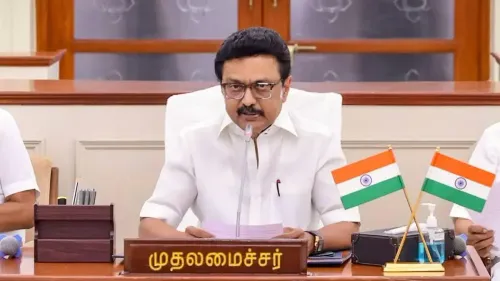Did Indira Gandhi Really Cede Territory to Pakistan in 1968?

Synopsis
Key Takeaways
- Nishikant Dubey has made serious allegations against Indira Gandhi.
- Dubey describes the 1968 territorial cession as painful.
- The Rann of Kutch dispute was settled by an international tribunal.
- India retained about 90% of the disputed territory.
- The allegations may lead to renewed debates over Congress policies.
New Delhi, May 24 (NationPress) BJP MP Nishikant Dubey has revived a significant historical debate by alleging that former Prime Minister Indira Gandhi surrendered Indian territory to Pakistan in 1968.
In reference to the post-war boundary resolution in the Rann of Kutch, Dubey described the event as "extremely painful" and accused the Congress party of "auctioning" India's land due to external pressures, despite opposition from Parliament, asserting that this reflects the true nature of the Iron Lady of India.
On the social media platform X, Dubey stated, "Today's story is heart-wrenching. After our victory in the 1965 war, the Congress party relinquished 828 sq km of the Rann of Kutch in Gujarat to Pakistan in 1968. We took the India-Pakistan issue to the global stage and engaged Yugoslavia's lawyer Ali Babar as a mediator."
"The entire Parliament was against it, but Indira Gandhi, the Iron Lady, compromised our territory out of fear. This is the reality of the Iron Lady. The Congress has always supported Pakistan," he added.
Dubey's comments reference the international arbitration that ensued after the Indo-Pak war of 1965, specifically addressing the Rann of Kutch border dispute.
In 1968, an international tribunal ruled on the Indo-Pakistan Western Boundary Case, deciding that India would retain approximately 90 percent of the disputed land, while around 10 percent—equating to roughly 828 square kilometers—would be awarded to Pakistan.
This tribunal was formed after both nations consented to settle their territorial conflict through international arbitration, with a neutral panel evaluating historical claims.
The final ruling aimed to resolve lingering disputes, including those concerning Sir Creek, and to lessen tensions along the western frontier.
However, Dubey views this as a leadership failure, accusing Indira Gandhi, who held power at that time, of capitulating Indian territory due to international pressure. He also posted a document on X purporting to support his claim that India ceded 828 square kilometers to Pakistan.
These allegations arise amid escalating political tensions and are likely to provoke discussion regarding historical choices made during the Congress era.
While the boundary decision was accepted by both nations at the time as a compromise for peace, Dubey's statements frame it as a diplomatic and political shortcoming.









